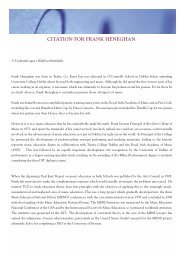TWICE THE SIZE - DIT Update - Dublin Institute of Technology
TWICE THE SIZE - DIT Update - Dublin Institute of Technology
TWICE THE SIZE - DIT Update - Dublin Institute of Technology
Create successful ePaper yourself
Turn your PDF publications into a flip-book with our unique Google optimized e-Paper software.
9.2 Policy Actions and Recommendations<br />
The exploration <strong>of</strong> the future through the identification <strong>of</strong> driving forces <strong>of</strong> change and the<br />
development <strong>of</strong> alternative future scenarios serves one aim – to understand what the future<br />
may bring and better prepare for it today. In order to do this, a range <strong>of</strong> policy themes and<br />
actions agendas were identified. These enable decision-makers to exploit positive opportunities<br />
and prepare for the threats that the future may bring.<br />
Five policy themes emerged during the early stages <strong>of</strong> the project. These include:<br />
1. ECONOMIC DEVELOPMENT<br />
2. GOVERNANCE<br />
3. PEOPLE AND QUALITY OF LIFE<br />
4. BUILT AND NATURAL ENVIRONMENT<br />
5. CREATIVITY AND INNOVATION<br />
The feedback from the gateways workshops, and the analysis <strong>of</strong> the material gathered from<br />
workshops, the futures surveys and strategic conversations, overwhelmingly point to<br />
GOVERNANCE as the key area <strong>of</strong> concern for the way forward. Governance embraces a<br />
number <strong>of</strong> various issues. The main problems detected in the current governance system by the<br />
project participants relate to the following.<br />
A deficiency in the balance <strong>of</strong> powers between central, regional and local tiers.<br />
The lack <strong>of</strong> regional government structures with executive powers and adequate levels <strong>of</strong><br />
funding to implement strategic policy and tactical decisions.<br />
Inefficient competition between City and County authorities due to ineffective and<br />
inappropriate boundaries.<br />
No democratic representation at the regional level.<br />
Little cohesion or coherence between planning and politics, especially in the long-term<br />
context.<br />
Poor processes and practices regarding effective and meaningful citizen participation in<br />
planning for the future.<br />
Widespread lack <strong>of</strong> vision and leadership in setting the future direction.<br />
Throughout the project, an extensive list <strong>of</strong> ‘action agendas’ that should be implemented within<br />
each policy themes was identified. Five <strong>of</strong> the most significant have been selected and are<br />
listed in the Table 7 below.<br />
138








